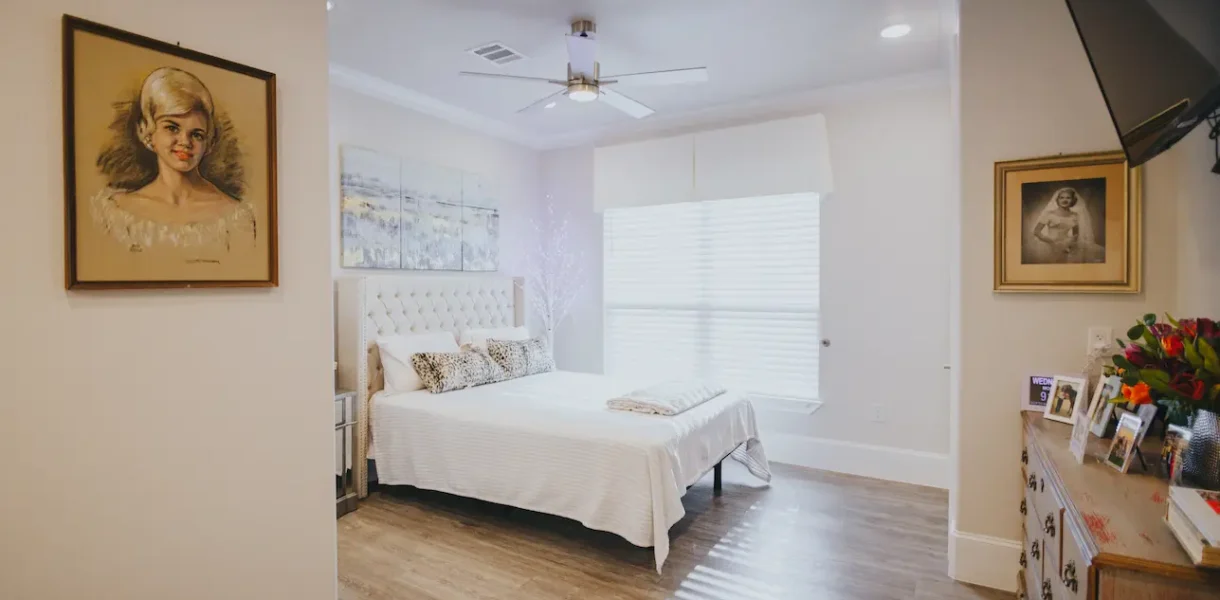
Decorating Tips for Memory Care Apartments
When moving a loved one to a memory care community, it’s important to design a living space that feels familiar, safe, and personalized. At Avalon Memory Care, we encourage families to bring elements of “home” into their loved one’s new apartment.
Here are some tips to help you decorate your loved one’s memory care apartment:
1. Personalize with Familiar Treasures:
Surrounding your loved one with familiar items can help them feel more at ease in their new home.
- Photos: Bring along some favorite family photos! Framed pictures and photo albums with loved ones and happy memories are a great way to start personalizing the space.
- Keepsakes: Include beloved objects like a favorite blanket, a treasured trinket, or a small piece of artwork that holds sentimental value.
- Furniture: If possible, bring familiar pieces of furniture from home, like a favorite armchair or a coffee table. This can provide a sense of continuity and comfort.
2. Create a Calming and Comfortable Atmosphere:
Here’s a few ways to create a peaceful and comfortable atmosphere that can help reduce anxiety and promote a sense of well-being.
- Colors: Choose calming colors like soft blues, greens, or lavenders for the walls and bedding. Avoid busy patterns or overly bright colors that might be overstimulating.
- Lighting: Ensure adequate lighting. Consider using soft, warm lighting to promote relaxation. Add night lights in hallways, bedrooms, and bathrooms to ensure visibility at night.
- Textures: Incorporate soft textures like cozy blankets and plush pillows to create a warm and inviting space.
3. Consider Safety and Functionality:
Creating a safe and functional space can help your loved one maintain their independence and reduce the risk of accidents.
- Clutter-free: Keep the space tidy and clutter-free to minimize confusion and prevent falls.
- Accessibility: Ensure walkways are clear and furniture is arranged to allow for easy movement. Make sure any rugs or mats throughout the apartment are non-slip.
- Reminders & Safety Information: Use a whiteboard or corkboard to display important information, such as personal and emergency contact phone numbers, in an obvious, visible location.
4. Incorporate Unique Touches:
Adding personal touches that reflect your loved one’s interests and personality can make their new apartment feel like home.
- Hobbies: Have items related to your loved one’s hobbies and interests easily accessible, such as books, puzzles, or craft supplies.
- Plants: Add a few easy-to-care-for plants to bring a touch of nature and vibrancy to the space.
By creating a space that feels like home, you can help your loved one adjust to their new surroundings in memory care. At all Avalon Memory Care communities, every space is designed to feel like home from secured patios to family-style living rooms.
Our compassionate team is here to support you in creating a personalized and welcoming space for your loved one. We can offer guidance on decorating and ensure the environment is safe and supportive. Contact Avalon Memory Care for more information.
See More Articles
- Understanding Parkinson’s Disease and Dementia
Parkinson’s disease is an incurable neurological disorder, with progressively worsening complications. Perhaps the most well-known symptom of Parkinson’s is a hand tremor, but it can also cause speech changes, muscle rigidity, and impaired posture. Eventually, as the disease progresses, more than half of all individuals with Parkinson’s will require dementia care. This particular type of
- The Long Goodbye: Understanding Anticipatory Grief and Dementia
When you have a family member who is suffering from dementia, it’s not unusual to find yourself experiencing sharp and sudden emotions. The gradual loss of a loved one is, in many ways, comparable to experiencing the death of someone close to you. With progressive dementia, this sense of loss is accompanied by another emotion
- Hope For the Future: Emerging Alzheimer’s Research
According to the latest statistics, as many as 5.5 million Americans are living with Alzheimer’s disease, and its prevalence is only expected to rise in the next few decades. At the same time, however, research into treatments for the condition is accelerating. With every passing year, we move a little further down the road toward
Testimonials
Downloadable Resources
We Are Avalon
Discover the heart of our community; download ‘We Are Avalon’ to get to know our dedicated team and our commitment to providing a warm, family-like environment.
Transitional Care Guide
If you’re considering a transition, we’re here to help; download our Transitional Care Guide for compassionate guidance through each step of the process.
Schedule a Tour
Visit one of our 30+ campuses and experience our unique approach to memory care.












